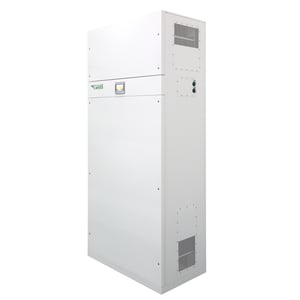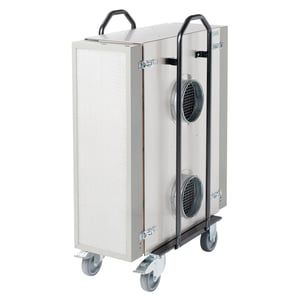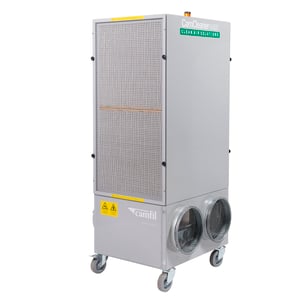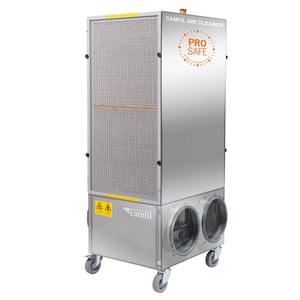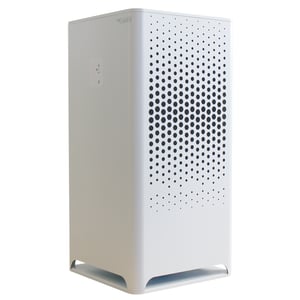
Camfil’s high-efficiency air filtration solutions are used by many global life science industry specialists in cleanrooms, production areas, and laboratories, including many global biosafety labs around the world. HEPA filtration is most trusted and is used in operating theatres, isolation rooms, critical care areas, etc in the hospitals. In the pharmaceutical industry, cleanroom air filtration and process dust collection solutions play a pivotal role in ensuring the manufacture of high-quality pharmaceutical products while meeting the stringent health and safety regulations. In the wake of COVID-19, authorities around the globe are taking a closer look at the way the life science industry approach indoor air quality (IAQ) in hopes of finding advanced air pollution solutions, systems, or products that can be applied to mass benefit.
HEPA filters are part of the category of so-called “absolute filters”, the term is justified by the fact that filters have a high filtering efficiency. HEPA H13 filters have an efficiency of 99.95% calculated on the size of MPPS (Most Penetrating Particle Size). The addition of the molecular layer ensures a healthier indoor environment through the effective removal of odors and gaseous contaminants.
Deploying high-efficiency air filtration (HEPA) through an HVAC system requires certain specifications and often changes are proposed that are not always possible. HEPA filters are dense and offer high efficiency. HEPA filters are used primarily in the ventilation system, as they protect against poor air quality, cross-contamination, and any financial implications caused due to harmful contaminations such as viruses. This high filter efficiency requires a large amount of air to pass through the ventilation system, so the airflow requirements of the HVAC system should be taken into account before upgrading to HEPA.
Tech specs: Metres cubed per second (m3 sec) is a measurement of airflow volume, determined by how many metres cubed of air pass by a stationary point in one second. To increase efficiency and thus pressure drop in a system can mean possible changes in the fan, power consumption, and can require duct or framework modifications. An effective and swift alternative is portable air cleaners equipped with HEPA air filters. They remove dust and harmful particles from the indoor air and can drastically reduce the risk of infection.
Air cleaners can help hospitals, pharmaceutical manufacturers, laboratories, and other applications in life science industry facilities remove airborne contaminants, particulates, dust, odours, gases, and pathogens without the need to replace or reconfigure the entire HVAC system. They are designed to supplement the HVAC system to not only protect people, products, and processes but also to reduce energy consumption.
Two additional concerns that are paramount are: protecting employees and ensuring the purity of the pharmaceuticals produced at the facility. In the pharmaceutical industry, drug-producing facilities have a variety of areas that include different cleanliness requirements including:
Aseptic processing that includes: Wash and Prep areas, Sterilizer Prep areas, Aseptic Filling areas, Restricted Access Barrier Systems (RABS), and Packaging areas
Oral Solid Dosage (OSD) facilities that include: Gowning areas, Compression Suites, Compaction/Milling areas, Coating areas, Isolator areas, and Down Flow Booths

Some areas even require dust collection equipment based upon the volume of airborne particles produced by the process. For carbon or oxidizers, gaseous air filters are used to remove odors or noxious contaminants. Without air filtration, we would not have even the basic pharmaceutical necessities. Air filters for pharmaceuticals should be selected for a guaranteed level of particle removal efficiency throughout the life of the filter. Certain properties that include long life, consistent low resistance to airflow, low impact on the environment & adherence, resistance to the intricacies of filter testing, decontamination, and cleanroom maintenance procedures should be part of the selection process. Camfil’s ProSafe range of filters are certified for use in processes with strict demands on safety, traceability, and control.
The air cleaners can perform four critical functions; two methods to generate negatively pressurized isolation areas and two methods to recirculate HEPA filtered air.
To generate negatively pressurized isolation areas:
1. Using a duct attached with a slip collar, in-room air is exhausted outside generating a negative pressure in the room.
2. Mounted interstitially and with slip collar mounted ducts on both intake and exhaust, air can be drawn through the duct and exhausted outside, generating negative pressure.
To recirculate HEPA filter air:
1. The portable unit is positioned where needed and draws in air through the bottom, exhausting filtered air through a vented top.
2. When mounted interstitially with slip collar mounted ducts on both intake and exhaust, air is drawn through the duct, filtered, and exhausted through a duct back into the originating area.

Contact our experts to find out how to reduce the potential spread of disease in the indoor environment of your laboratory, hospital, clinics, pharmaceutical manufacturing, and other facilities. In addition to particle removal efficiency, you’ll also get solutions with a long lifespan, reduced environmental impact, and low total cost of ownership.
High efficiency air cleaners can help you comply with the toughest regulations, control contaminants, protect products, process and equipment, and safeguard patients, lab researchers and production workers.
